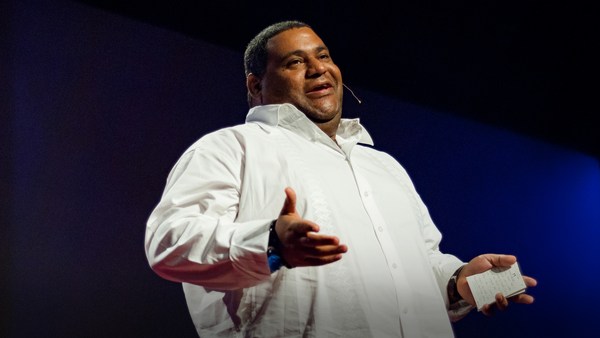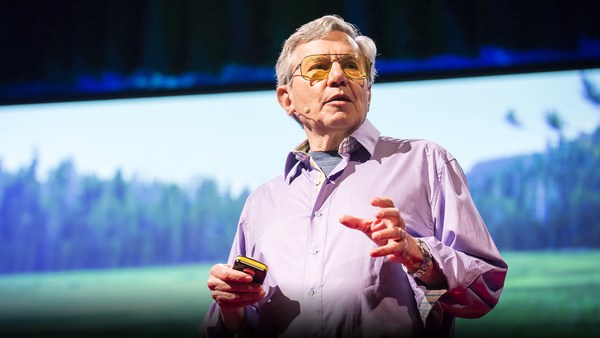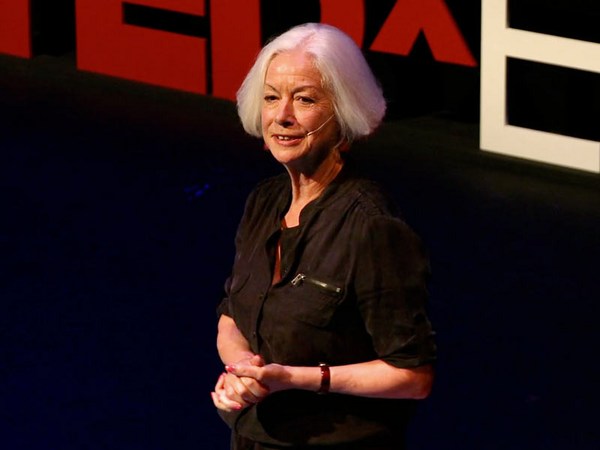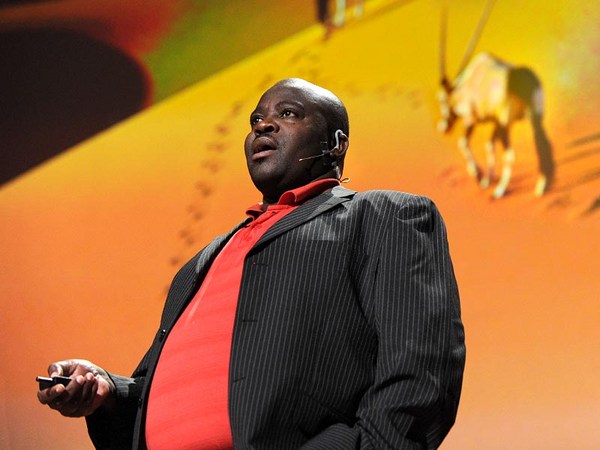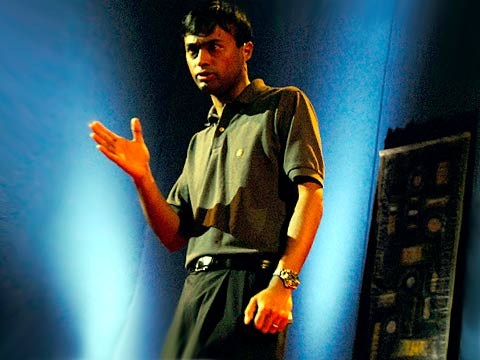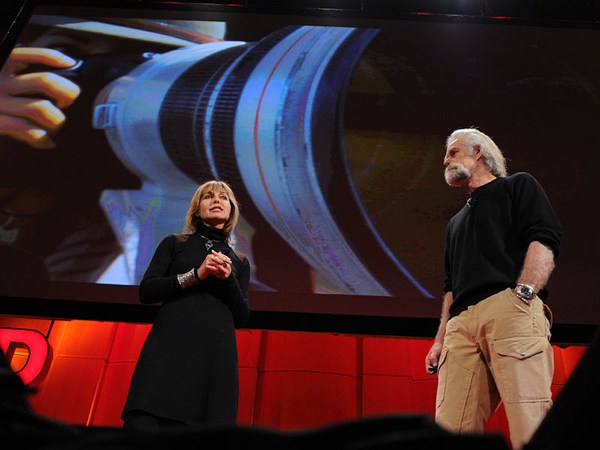I'm a man who's trying to live from his heart, and so just before I get going, I wanted to tell you as a South African that one of the men who has inspired me most passed away a few hours ago. Nelson Mandela has come to the end of his long walk to freedom. And so this talk is going to be for him.
I grew up in wonder. I grew up amongst those animals. I grew up in the wild eastern part of South Africa at a place called Londolozi Game Reserve. It's a place where my family has been in the safari business for four generations. Now for as long as I can remember, my job has been to take people out into nature, and so I think it's a lovely twist of fate today to have the opportunity to bring some of my experiences out in nature in to this gathering. Africa is a place where people still sit under starlit skies and around campfires and tell stories, and so what I have to share with you today is the simple medicine of a few campfire stories, stories about heroes of heart. Now my stories are not the stories that you'll hear on the news, and while it's true that Africa is a harsh place, I also know it to be a place where people, animals and ecosystems teach us about a more interconnected world.
When I was nine years old, President Mandela came to stay with my family. He had just been released from his 27 years of incarceration, and was in a period of readjustment to his sudden global icon status. Members of the African National Congress thought that in the bush he would have time to rest and recuperate away from the public eye, and it's true that lions tend to be a very good deterrent to press and paparazzi. (Laughter) But it was a defining time for me as a young boy. I would take him breakfast in bed, and then, in an old track suit and slippers, he would go for a walk around the garden. At night, I would sit with my family around the snowy, bunny-eared TV, and watch images of that same quiet man from the garden surrounded by hundreds and thousands of people as scenes from his release were broadcast nightly. He was bringing peace to a divided and violent South Africa, one man with an unbelievable sense of his humanity. Mandela said often that the gift of prison was the ability to go within and to think, to create in himself the things he most wanted for South Africa: peace, reconciliation, harmony. Through this act of immense open-heartedness, he was to become the embodiment of what in South Africa we call "ubuntu." Ubuntu: I am because of you. Or, people are not people without other people. It's not a new idea or value but it's one that I certainly think at these times is worth building on. In fact, it is said that in the collective consciousness of Africa, we get to experience the deepest parts of our own humanity through our interactions with others. Ubuntu is at play right now. You are holding a space for me to express the deepest truth of who I am. Without you, I'm just a guy talking to an empty room, and I spent a lot of time last week doing that, and it's not the same as this. (Laughter)
If Mandela was the national and international embodiment, then the man who taught me the most about this value personally was this man, Solly Mhlongo. Solly was born under a tree 60 kilometers from where I grew up in Mozambique. He would never have a lot of money, but he was to be one of the richest men I would ever meet. Solly grew up tending to his father's cattle. Now, I can tell you, I don't know what it is about people who grow up looking after cattle, but it makes for über-resourcefulness. The first job that he ever got in the safari business was fixing the safari trucks. Where he had learned to do that out in the bush I have no idea, but he could do it. He then moved across into what we called the habitat team. These were the people on the reserve who were responsible for its well-being. He fixed roads, he mended wetlands, he did some anti-poaching. And then one day we were out together, and he came across the tracks of where a female leopard had walked. And it was an old track, but for fun he turned and he began to follow it, and I tell you, I could tell by the speed at which he moved on those pad marks that this man was a Ph.D.-level tracker. If you drove past Solly somewhere out on the reserve, you look up in your rearview mirror, you'd see he'd stopped the car 20, 50 meters down the road just in case you need help with something. The only accusation I ever heard leveled at him was when one of our clients said, "Solly, you are pathologically helpful." (Laughter)
When I started professionally guiding people out into this environment, Solly was my tracker. We worked together as a team. And the first guests we ever got were a philanthropy group from your East Coast, and they said to Solly, on the side, they said, "Before we even go out to see lions and leopards, we want to see where you live." So we took them up to his house, and this visit of the philanthropist to his house coincided with a time when Solly's wife, who was learning English, was going through a phase where she would open the door by saying, "Hello, I love you. Welcome, I love you." (Laughter) And there was something so beautifully African about it to me, this small house with a huge heart in it.
Now on the day that Solly saved my life, he was already my hero. It was a hot day, and we found ourselves down by the river. Because of the heat, I took my shoes off, and I rolled up my pants, and I walked into the water. Solly remained on the bank. The water was clear running over sand, and we turned and we began to make our way upstream. And a few meters ahead of us, there was a place where a tree had fallen out of the bank, and its branches were touching the water, and it was shadowy. And if had been a horror movie, people in the audience would have started saying, "Don't go in there. Don't go in there." (Laughter) And of course, the crocodile was in the shadows. Now the first thing that you notice when a crocodile hits you is the ferocity of the bite. Wham! It hits me by my right leg. It pulls me. It turns. I throw my hand up. I'm able to grab a branch. It's shaking me violently. It's a very strange sensation having another creature try and eat you, and there are few things that promote vegetarianism like that. (Laughter) Solly on the bank sees that I'm in trouble. He turns. He begins to make his way to me. The croc again continues to shake me. It goes to bite me a second time. I notice a slick of blood in the water around me that gets washed downstream. As it bites the second time, I kick. My foot goes down its throat. It spits me out. I pull myself up into the branches, and as I come out of the water, I look over my shoulder. My leg from the knee down is mangled beyond description. The bone is cracked. The meat is torn up. I make an instant decision that I'll never look at that again. As I come out of the water, Solly arrives at a deep section, a channel between us. He knows, he sees the state of my leg, he knows that between him and I there is a crocodile, and I can tell you this man doesn't slow down for one second. He comes straight into the channel. He wades in to above his waist. He gets to me. He grabs me. I'm still in a vulnerable position. He picks me and puts me on his shoulder. This is the other thing about Solly, he's freakishly strong. He turns. He walks me up the bank. He lays me down. He pulls his shirt off. He wraps it around my leg, picks me up a second time, walks me to a vehicle, and he's able to get me to medical attention. And I survive.
Now — (Applause)
Now I don't know how many people you know that go into a deep channel of water that they know has a crocodile in it to come and help you, but for Solly, it was as natural as breathing. And he is one amazing example of what I have experienced all over Africa. In a more collective society, we realize from the inside that our own well-being is deeply tied to the well-being of others. Danger is shared. Pain is shared. Joy is shared. Achievement is shared. Houses are shared. Food is shared. Ubuntu asks us to open our hearts and to share, and what Solly taught me that day is the essence of this value, his animated, empathetic action in every moment.
Now although the root word is about people, I thought that maybe ubuntu was only about people. And then I met this young lady. Her name was Elvis. In fact, Solly gave her the name Elvis because he said she walked like she was doing the Elvis the pelvis dance. She was born with very badly deformed back legs and pelvis. She arrived at our reserve from a reserve east of us on her migratory route. When I first saw her, I thought she would be dead in a matter of days. And yet, for the next five years she returned in the winter months. And we would be so excited to be out in the bush and to come across this unusual track. It looked like an inverted bracket, and we would drop whatever we were doing and we would follow, and then we would come around the corner, and there she would be with her herd. And that outpouring of emotion from people on our safari trucks as they saw her, it was this sense of kinship. And it reminded me that even people who grow up in cities feel a natural connection with the natural world and with animals. And yet still I remained amazed that she was surviving. And then one day we came across them at this small water hole. It was sort of a hollow in the ground. And I watched as the matriarch drank, and then she turned in that beautiful slow motion of elephants, looks like the arm in motion, and she began to make her way up the steep bank. The rest of the herd turned and began to follow. And I watched young Elvis begin to psych herself up for the hill. She got visibly -- ears came forward, she had a full go of it and halfway up, her legs gave way, and she fell backwards. She attempted it a second time, and again, halfway up, she fell backwards. And on the third attempt, an amazing thing happened. Halfway up the bank, a young teenage elephant came in behind her, and he propped his trunk underneath her, and he began to shovel her up the bank. And it occurred to me that the rest of the herd was in fact looking after this young elephant. The next day I watched again as the matriarch broke a branch and she would put it in her mouth, and then she would break a second one and drop it on the ground. And a consensus developed between all of us who were guiding people in that area that that herd was in fact moving slower to accommodate that elephant.
What Elvis and the herd taught me caused me to expand my definition of ubuntu, and I believe that in the cathedral of the wild, we get to see the most beautiful parts of ourselves reflected back at us. And it is not only through other people that we get to experience our humanity but through all the creatures that live on this planet. If Africa has a gift to share, it's a gift of a more collective society. And while it's true that ubuntu is an African idea, what I see is the essence of that value being invented here.
Thank you.
(Applause)
Pat Mitchell: So Boyd, we know that you knew President Mandela from early childhood and that you heard the news as we all did today, and deeply distraught and know the tragic loss that it is to the world. But I just wondered if you wanted to share any additional thoughts, because we know that you heard that news just before coming in to do this session.
Boyd Varty: Well thanks, Pat. I'm so happy because it was time for him to pass on. He was suffering. And so of course there's the mixed emotions. But I just think of so many occurrences like the time he went on the Oprah show and asked her what the show would be about. (Laughter) And she was like, "Well, it'll be about you." I mean, that's just incredible humility. (Laughter)
He was the father of our nation and we've got a road to walk in South Africa. And everything, they used to call it Madiba magic. You know, he used to go to a rugby match and we would win. Anywhere he went, things went well. But I think that magic will be with us, and the important thing is that we carry what he stood for. And so that's what I'm going to try and do, and that's what people all over South Africa are trying to do.
PM: And that's what you've done today. BV: Oh, thank you.
PM: Thank you. BV: Thank you. Thanks very much.
(Applause)
